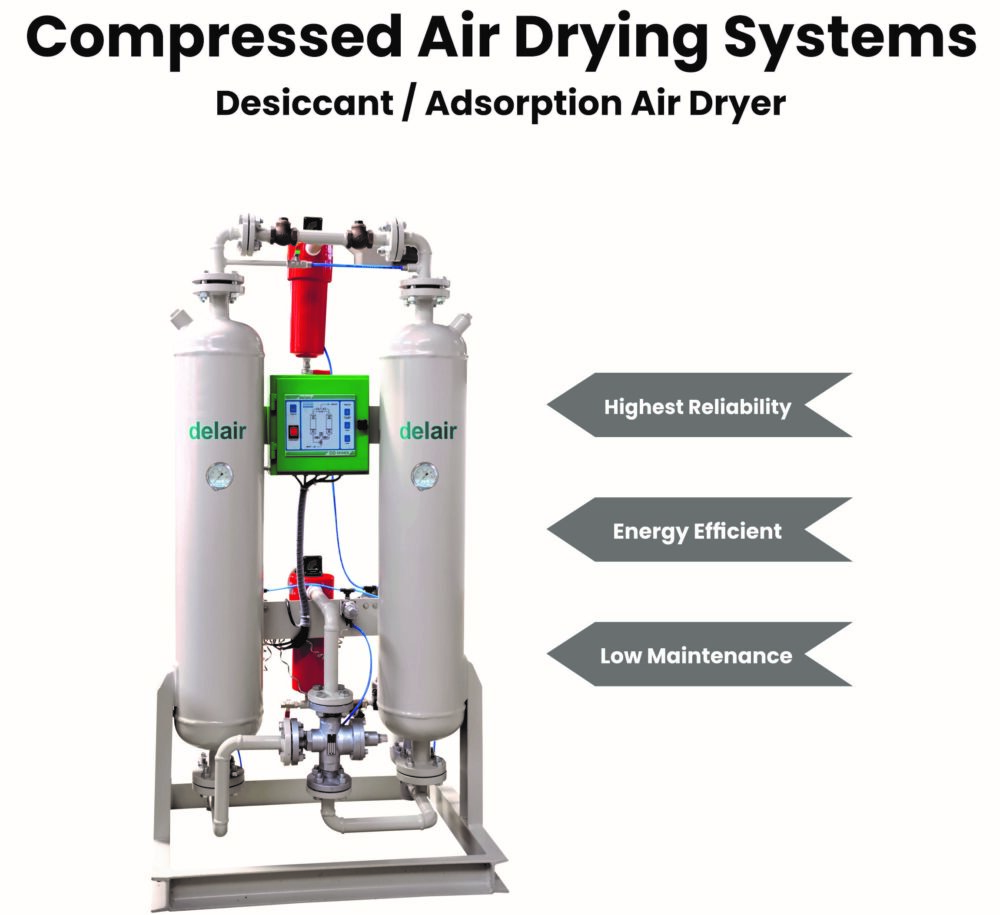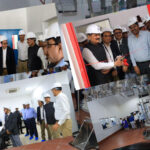Dry compressed air finds irreplaceable application in the entire processing, manufacturing, and packaging of pharmaceutical products with enhancing the medicine life cycle. Moisture can potentially threaten the production efficiency and quality of the end products.


Pharmaceutical forms an intricate part of healthcare services. Though it always played a pivotal role, the importance was starkly felt during the pandemic. Responsible for curing and enhancing human health, pharmaceutical products are sought worldwide and this mandates the industry to be strictly regulated. Considering that India secures 3rd position in pharmaceutical production globally, the need to comply with the highest industry standards becomes a prerequisite more than ever.
The country emerges as the prominent supplier in the global pharmaceutical market, where India fulfills the demand for 50% of various vaccines globally along with meeting 40% of generic demand in the US and 25% of all medicine requirements in the UK. As a result, a great responsibility is vested on the manufacturers to deploy dry compressed air throughout the manufacturing till the packaging to produce quality drugs and medicine suitable for the international as well as domestic market. This becomes necessary as even the Food and Drug Administration (FDA) issues directions to the pharma companies to adopt uncontaminated compressed air for rendering high-quality end products.
Quality compressed air finds irreplaceable application
Therefore, to maintain the supreme quality of pharmaceutical products, quality compressed air finds irreplaceable application in the entire processing, manufacturing, and packaging of pharmaceutical products. All the intricate operations involving pneumatic processes like tablets and capsule manufacturing; giving the required texture, color, and flavor to the tablet; maintaining the right balance of the ingredients; protecting the products from contamination, etc. require compressed air at every step to produce high-quality end products meeting the highest industry standards.
Quality compressed air confers the necessary framework to the pharmaceutical industry. It is widely used in automatic packaging machinery for sealing, Capsule Filling Machine, Powder Filling Machine, Blister Pack Machine, Tablet Press Machine, Drying Container, Vacuum cleaning system. In case untreated compressed air is supplied for any of the processes then there are high chances of the presence of moisture in the airline. As moisture inherently comes with various destructive characteristics, it can potentially threaten the production efficiency and quality of the end products.
Moisture is invariably present in the air and can enter the manufacturing facility through the ceilings, walls, and floors. It is a great deterrent for the pharmaceutical industry as it gives rise to problems ranging from the disintegration of tablets to lumping, caking, uneven coating on tablets, decomposition of formulations, agglomeration of chemical compounds, and inability to compress tablets which cumulatively lead to shorter shelf life of products. Considering that pharmaceutical products are hygroscopic in nature, they undergo physical, microbiological, enzymatic, and biochemical deterioration even when moisture is present in a negligible amount. Moisture not only changes the color coating of the tablet but even causes blisters in them that lead to breakage of the tablets.
Moisture reduces medicinal value:
The detrimental effect of moisture can be clearly seen in tablet compression. In this, the powdered materials are bounded into a capsule or tablet in its dry state under the presence of high pressure. Here, humidity is not just responsible for falling of the tablets apart but it initiates decomposition of the drugs which ultimately reduces their medicinal value. Even during tablet coating, if the cooling and drying are not done at the desired rate with the proper quality of compressed air, then it leads to the rough, translucent coating which is unsatisfactory in appearance.
Furthermore, excessive moisture can initiate injurious activities of micro-organisms. It is responsible for increased microbial activity in the organic material that indirectly contributes to the destruction of the material. The mold, mildew, and fungi are already present in the air and germinate when met with a conducive combination of temperature and humidity. The microbial growth causes the decomposition of the material which in turn leads to the mechanical weakening of the product.
Here, it is important to note that the menace of moisture is not just limited to the manufacturing of medicines and other pharmaceutical products but it can contaminate the product even during the packaging. Hence, it is important to address the issue at every level of the product cycle and one must not relax just at the production stage.
Therefore, it is clear that untreated compressed air is heavily loaded with potentially harmful or dangerous contaminants. It is mandatory to remove the moisture from the air for the protection of the consumers by providing them with safe and cost-effective drugs. Manufacturers must ensure the compressed air is free from any form of contaminants like water/ moisture, dust particles, oil, and solid contaminants.
The moisture menace is not just limited to the deterioration of drugs and medicine but has a damaging effect on the pneumatic tools and machines as well. High levels of humidity cause corrosion in the pipelines, cylinders, and other components that lead to the malfunctioning of the equipment. It is responsible for the sluggish and inconsistent performance of the pneumatic valve and cylinder. The problem is further compounded by the freezing of moisture during cold weather. All the factors together are responsible for the increased downtime of the machines which invariably incurs heavy liability in the form of maintenance costs for the company.
Looking at the various repercussions of moisture, the pharmaceutical industry must install compressed air dryers to eliminate even the slightest presence of moisture in the air. It helps in the treatment of compressed air powering various pneumatic processes. The advanced dryers come with a wide range of refrigeration and desiccant/adsorption dryers. Though both of them work on different principles but are well equipped to achieve the same desired result of removing moisture from the compressed air.
Desiccant based drying method is recommended specially for pharmaceutical industry where process require the dry compressed air having best pressure dew point of (-20oC) to (-40oC) max. The properties of desiccant using this drying method is to adsorb and desorb the water vapour, It uses pressure swing principle / purge air to regenerate the desiccant bed.
Hence, it can be said that dry compressed air is the fourth utility of the pharmaceutical industry. It gives a structural framework to the industry which ensures the highest quality end product. Along with this, by intervening with the malfunctioning effects of moisture on the pneumatic machines, it substantially reduces the downtime of the equipment. This plays a major role in invariably adding value to the revenue of the company as they can avoid any unnecessary maintenance costs and even curb the instances of production glitches that could result from damaged machines.


Deepak Pahwa
Director- Delair











